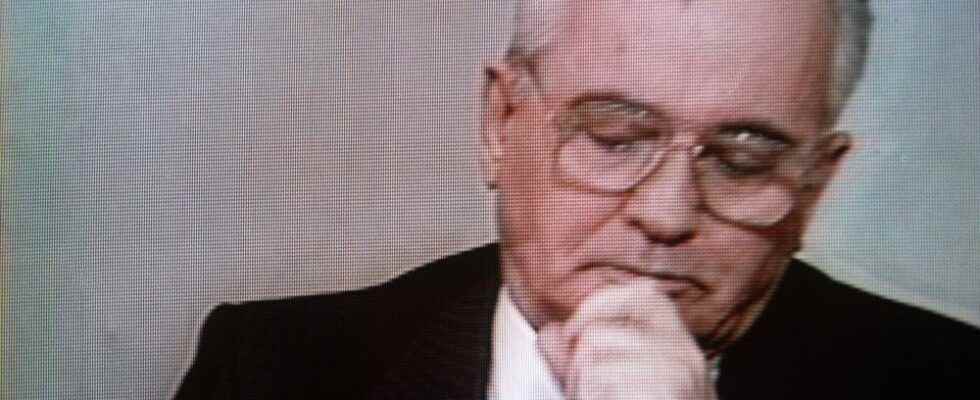In the first issue of L’Express for 1992, devoted to the end of the USSR, Yves Cuau takes stock of the last president of the Soviet Union. According to him, History will retain above all Mikhail Gorbachev, that at the time of the dislocation of the USSR, he refused to shed blood.
L’Express of January 2, 1992
Good bye and thank you !
Nazism had disappeared in a Wagnerian apocalypse with the fall of Berlin and the suicide of its Führer. The other great totalitarian ideology of the century died peacefully, live on television, on the evening of December 25, 1991.
It is easy today to quibble about the historical role of the first and last president of the USSR. Many Sovietologists rightly recall that he was chosen by his peers to save the regime and the empire, and not to liquidate them. What does it matter! The very idea of reforming communism through glasnost and perestroika was extravagant, but it was Gorbachev, and he alone, who gave freedom to hundreds of millions of men and women, from the heart from Europe to the shores of the Pacific.
What will they use it for? There will undoubtedly be many violent convulsions tomorrow, within the new confederation as in some of the old people’s democracies. But we must marvel at an unprecedented event. The collapse of the “evil empire” occurred almost peacefully. There were, of course, bloody blunders, armed confrontations, from Transcaucasia to the Baltic countries, from Kazakhstan to Azerbaijan. But, after more than seven decades of ruthless dictatorship, they caused fewer deaths in total than a few weekend road accidents in the West. It’s a miracle. This sweet agony of a hateful regime, we owe it to Mikhail Gorbachev alone. He was seriously mistaken in thinking that he could “modernize” Marxism-Leninism. But when he began to realize the immensity of his mistake, he still had the strength. He did not use it, and for this he deserves the recognition of the whole world.
Mikhail Gorbachev prepares to speak on television to announce the breakup of the USSR, December 25, 1991. AFP PHOTO TV / APH (Photo by TV GRAB / AFP)
AFP
He will have totally underestimated the bankruptcy of his country’s economy, the thirst for freedom of his compatriots, the strength of national feelings, and also the will to power of his former friend Boris Yeltsin, who emerged as the big winner of the failed putsch of the month of August 1991. All this is true, and the contrast was striking between the indifference of the streets in Moscow at the announcement of his expected resignation and the real emotion often shown abroad. But how could it have been otherwise?
Germans, Poles, Czechs and many others know what they owe Gorbachev. The fall of the Berlin wall, the “velvet revolution” in Prague did not cause casualties, while the divisions of the Red Army were still massively present around these capitals in a state of peaceful insurrection.
Distrust of certain excesses of “gorbimania” was legitimate in the West after the arrival in the Kremlin, in March 1985, of a man whose old apparatchik Gromyko himself said that he had “teeth of steel “. From the summer of 1989, doubt was no longer possible. The illusory reformer had been transformed into a liquidator of non-violent bankruptcy. This bankruptcy, Mikhail Gorbachev’s compatriots feel it strongly in all aspects of their daily life: problematic supplies, endless queues, collapse of the national currency, rising tomorrow, the price of all basic necessities. Hence their indifference to the personal fate of their former president. In Washington, Paris, London or Bonn, on the other hand, we know what we owe to “Gorby”: end of the cold war, liberation of Eastern Europe, disarmament agreements, but also support to the rule of law in the Gulf War and co-sponsorship of the regional peace conference on the Middle East. For all this, goodbye and thank you, Mr. Gorbachev!
It would be fair to associate two men today with the balance sheet of its action. The first is his distant 1956 predecessor, Nikita Khrushchev, now well forgotten. Before shattering hope in Hungary and being driven from power, he was also the author of the famous secret report on Stalin’s crimes at the 20th Party Congress. Gorbachev, in a way, is a Khrushchev who would have gone to the end of his logic… The second character whose name will remain linked to that of Gorbachev is Ronald Reagan. It was the former President of the United States, so often treated with imbecilic condescension in Europe, who imposed the throwing in the towel on the Soviet leaders with his project of “star wars” which the USSR could not counter without accelerating its inexorable march towards underdevelopment. January 1, 1992 marks the beginning of a zero year for modern Russia. Will Gorbachev play the role of leader of the opposition there tomorrow? May. This communist whose honor was to refuse to shed blood will long remain a statue of the Commander for his successors.
